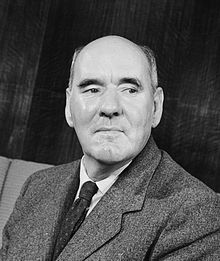C. Northcote Parkinson
| C. Northcote Parkinson | |
|---|---|

Cyril Northcote Parkinson in 1961
|
|
| Born | Cyril Northcote Parkinson 30 July 1909 Barnard Castle, County Durham, England |
| Died | 9 March 1993 (aged 83) Canterbury, Kent, England |
| Resting place | Canterbury |
| Occupation | Naval historian |
| Nationality | British |
| Education |
University of Cambridge King's College London |
| Subject | Naval history |
| Notable works | Parkinson's Law (1957) |
| Notable awards | Julian Corbett Prize in Naval History |
Cyril Northcote Parkinson (30 July 1909 – 9 March 1993) was a British naval historian and author of some 60 books, the most famous of which was his best-seller Parkinson's Law, which led him to be also considered as an important scholar in public administration and management.
Parkinson's law, which provides insight into a primary barrier to efficient time management, states that, "work expands so as to fill the time available for its completion". This articulates a situation and an unexplained force that many have come to take for granted and accept. "In exactly the same way nobody bothered and nobody cared, before Newton's day, why an apple should drop to the ground when it might so easily fly up after leaving the tree," wrote Straits Times editor-in-chief, Allington Kennard who continued, "There is less gravity in Professor Parkinson's Law, but hardly less truth."
Parkinson first published his law in a humorous satirical article in the Economist on 19 November 1955, meant as a critique on the efficiency of public administration and civil service bureaucracy, and the continually rising headcount, and related cost, attached to these. That article noted that, "Politicians and taxpayers have assumed (with occasional phases of doubt) that a rising total in the number of civil servants must reflect a growing volume of work to be done." The law examined two sub-laws, The Law of Multiplication of Subordinates, and The Law of Multiplication of Work, and provided 'scientific proof' of the validity of these, including mathematical formulae.
Two years later, the law was revisited when Parkinson's new books, Parkinson's Law And Other Studies in Administration and Parkinson's Law: Or The Pursuit of Progress were published in 1957.
In Singapore, where he was teaching at the time, this began a series of talks where he addressed diverse audiences in person, in print and over the airwaves on 'Parkinson's Law'. For example, on 16 October 1957, at 10 a.m., he spoke on this at the International Women's Club programme talk held at the Y.W.C.A. at Raffles Quay. The advent of his new book as well as an interview during his debut talk was covered in an editorial in The Straits Times, shortly after, entitled, "A professor's cocktail party secret: They arrive half an hour late and rotate." Time, which also wrote about the book noted that its theme was "a delightfully unprofessional diagnosis of the widespread 20th century malady — galloping orgmanship." Orgmanship, according to Parkinson, was "the tendency of all administrative departments to increase the number of subordinate staff, 'irrespective of the amount of work (if any) to be done," as noted by the Straits Times. Parkinson, it was reported, wanted to trace the illegibility of signatures, the attempt being made to fix the point in a successful executive career at which the handwriting becomes meaningless, even to the executive himself."
...
Wikipedia
